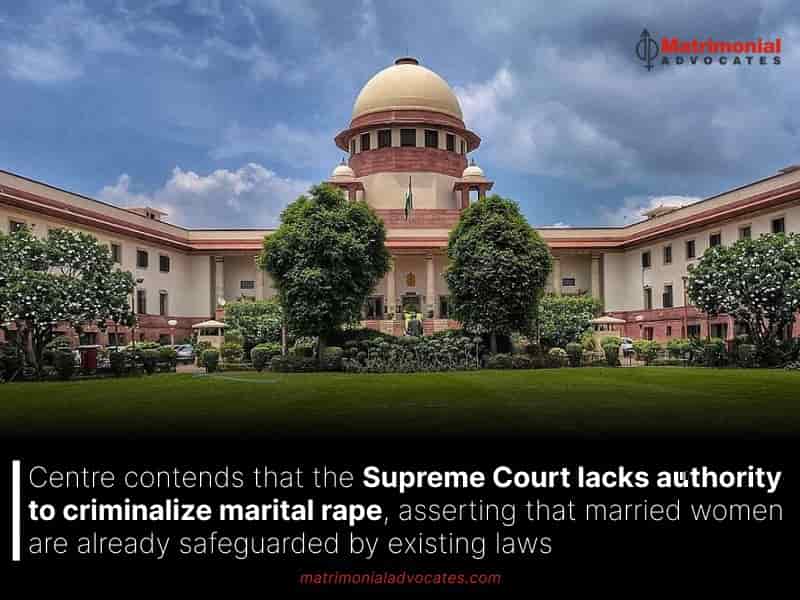
The Centre said that it is not as if a woman’s consent is obliterated by marriage, but only that consent violations within marriage would not attract rape law; there are other remedies.
The Union government filed an affidavit in the Supreme Court on Thursday, opposing petitions calling for the criminalization of marital rape in India [Hrishikesh Sahoo vs Union of India and anr].
In the counter-affidavit submitted by advocate AK Sharma, the Union Home Ministry defended the existing rape laws, which exclude sexual relations between a husband and wife from being classified as rape.
The Central government argued that the matter is primarily a social issue rather than a legal one, with broad implications for society. It asserted that even if ‘marital rape’ were to be criminalized, it is not within the Supreme Court’s jurisdiction to make such changes.
“The (issue) cannot be decided without proper consultation with all the stakeholders or taking the views of all the States into consideration … the act colloquially referred to as ‘marital rape’ ought to be illegal and criminalized. The Central Government asserts that a woman’s consent is not obliterated by marriage, and its violation should result in penal consequences. However, the consequences of such violations within marriage differ from those outside it,” the affidavit said.
The Centre contended that a breach of consent should be penalized differently depending on whether it occurs within or outside of marriage.
It acknowledged that within marriage, there is an inherent expectation of reasonable sexual access between spouses. However, the Centre clarified that this expectation does not grant a husband the right to compel his wife into sexual activity against her will.
Despite this, the Centre argued that applying anti-rape laws to such instances could be excessive and disproportionate.
The Centre highlighted that Parliament has already put in place several legal measures to protect a married woman’s consent within marriage.
These include provisions for penalizing cruelty against married women (Section 498A of the Indian Penal Code), laws addressing offenses against a woman’s modesty, and safeguards under the Protection of Women from Domestic Violence Act, 2005.
“The sexual aspect is but one of many facets of the relationship between husband and wife, on which the bedrock of their marriage rests … Given the nature of the marital institution in our socio-legal milieu, if the legislature is of the view that, for preservation of the marital institution, the impugned Exception should be retained, it is submitted that it would not be appropriate for this Hon’ble Court to strike down the Exception,” the affidavit added.
The counter-affidavit was submitted in response to a series of petitions advocating for the criminalization of marital rape.
The act colloquially referred to as ‘marital rape’ ought to be illegal and criminalized … However, consequences of such violations within marriage differ.
Central government
The Centre criticized the petitioners for viewing marriage solely as a private institution, calling this perspective one-dimensional.
It asserted that the relationship between a married woman and her husband cannot be treated the same as other scenarios. The Centre further emphasized that it is the legislature’s role to define the legal consequences of sexual abuse based on different circumstances.
The Central government argued that current laws do not disregard consent between spouses but instead approach it differently within the context of marriage. This differentiation, according to the Centre, aligns with Article 14 (right to equality) of the Constitution, as it prevents equating two fundamentally different situations—sexual relations within marriage and those outside it.
The Union government reaffirmed its commitment to protecting women’s liberty and dignity, stating that there is no need to criminalize marital rape since there are other “appropriately tailored penal remedies” in place.
Marital rape is excluded from the definition of “rape” under Exception 2 of Section 375 of the Indian Penal Code (IPC).
A comparable provision is also included in the newly enacted Bharatiya Nyaya Sanhita (BNS), which replaced the IPC on July 1 this year.
In 2022, the Delhi High Court delivered a split verdict on whether marital rape should be criminalized, after which the case was taken to the Supreme Court in September of the same year.
Note: The heading of the story initially said “decriminalise” instead of “criminalise”. The error has been corrected and is regretted.





